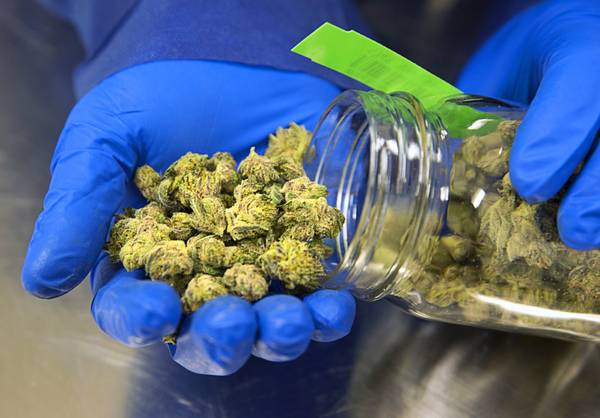Related news
CARSON CITY — If recent assertions against recreational marijuana made by leaders in President Donald Trump’s administration come to fruition, Nevada would have few options for stopping federal intervention, Gov. Brian Sandoval said this week.
“That was always an issue — it’s illegal under federal law,” Sandoval told the Sun. “That hasn’t changed.”
Sandoval, who opposed the initiative last November allowing adults 21 and older to possess and recreationally use up to one ounce of marijuana flower or one-eighth of an ounce of marijuana concentrates, said his office will continue to push forward framework for the voter-approved initiative, which passed 54 percent to 45 percent last fall.
Sandoval on Feb. 3 signed an executive order to establish a Blue Ribbon Task Force, and one month earlier signed off on nearly $1 million in funding for the Nevada Department of Taxation for added staff to regulate and tax the new industry.
The Governor’s Task Force for the Regulation and Taxation of Marijuana Act will hold eight workshops next week to hammer out framework on everything from cultivation of recreational marijuana to sales, law enforcement and consumer education policies. Sandoval suggested the best way to keep federal hands off the state’s recreational marijuana program, which could see its first legal sales happen as early as July, was to “make sure it’s restricted and respected.”
“We’re trying to learn lessons from the mistakes of other states, like Colorado, Oregon and Washington,” he said. “Ideally, this is going to be a system that people are going to mimic as time goes forward.”
Sandoval wouldn’t comment when asked whether he believed the federal government had the right to intervene with voter-approved recreational marijuana in Nevada. But other elected officials interviewed in Carson City this week said they doubted such an intervention could realistically take place.
Nevada state Sens. Tick Segerblom, D-Las Vegas, and Patricia Farley, I-Las Vegas, who were among the legislators leading the charge in favor of the marijuana ballot question, both referred to the U.S. Constitution in agreeing that federal law would triumph over Nevada laws on marijuana.
But executing such laws would be difficult, Segerblom said, adding there was “no way” federal authorities would deny an estimated 60 million law-abiding recreational marijuana users and thousands of legal pot vendors access to the plant.
“Pragmatically, I just don’t see how they can do it,” Segerblom said. “You can’t let the genie back in the bottle. And as more states legalize it, I just don’t think there’s any way to turn around and stop it all.”
Farley added, “There are a lot of federal laws that aren’t the same as state’s laws, and the moment they start picking and choosing which ones they’re going to enforce, I think that’s opening up Pandora’s Box.”
Four-term Assemblyman Ira Hansen, R-Sparks, a staunch opponent of the ballot question, said Wednesday he didn’t understand why Nevada — a state that has traditionally passed laws to comply with federal laws, especially those on civil rights — would push to legalize something that is “the exact opposite” of what federal law allows.
“I see this as a train wreck coming,” Hansen said. “You have a new federal administration that’s going to enforce the marijuana laws apparently, and then you got us going the other way, saying we’re going to let whatever happens happen.”
Hansen, a self-proclaimed state’s rights advocate, has been in favor of protecting recreational marijuana in Nevada since it became law. He said Nevada Attorney General Adam Laxalt likely wouldn’t get involved in the event of federal intervention. Laxalt wasn't immediately available for comment.
Speculation that the Trump administration would begin cracking down on the eight U.S. states that allow marijuana for recreational use was intensified late last month when Trump Press Secretary Sean Spicer said he expected to see “greater enforcement” of federal marijuana laws.
Four days later, U.S. Attorney General Jeff Sessions doubled down on Spicer’s comments during a meeting with reporters at the U.S. Department of Justice headquarters, and last week told conservative radio show host Hugh Hewitt that the feds would enforce the law “in an appropriate way” nationwide.
“Marijuana is against federal law and that applies in states where they may have repealed their own anti-marijuana laws,” Sessions told Hewitt.
But Sessions also said, “It’s not possible for the federal government, of course, to take over everything the local police used to do in a state that’s legalized it.”
But while Trump administrators push for intervention, some federal lawmakers are doing the opposite.
Rep. Tom Garrett, R-Virginia, has proposed legislation to remove marijuana from the Drug Enforcement Agency’s list of Schedule I controlled substances. Schedule I, which includes heroin and Ecstasy, is reserved for drugs with a high potential for abuse. Also, Garrett's plan would grant more power to states to regulate their own marijuana programs.
Despite the ambiguity on the federal level, state lawmakers said, until further notice, they're forging ahead with marijuana regulation in Nevada.
“Medical marijuana is in our state constitution and now recreational marijuana is in our state law,” Sandoval said. “As far as I’m concerned, we’re going to move forward, with the Department of Taxation promulgating those regulations.”


Join the Discussion:
Check this out for a full explanation of our conversion to the LiveFyre commenting system and instructions on how to sign up for an account.
Full comments policy